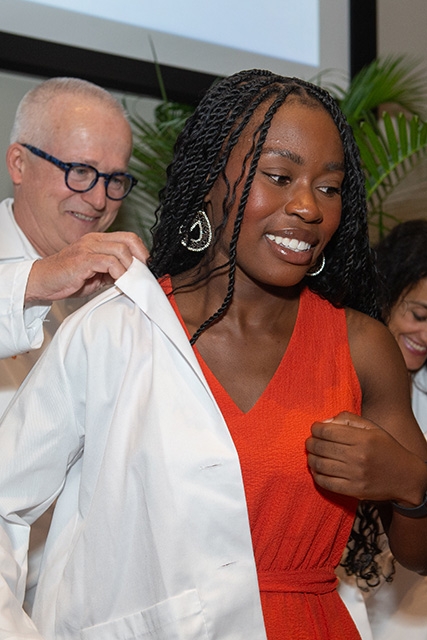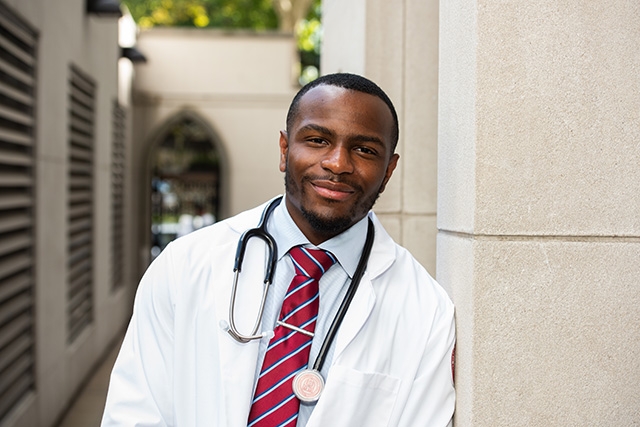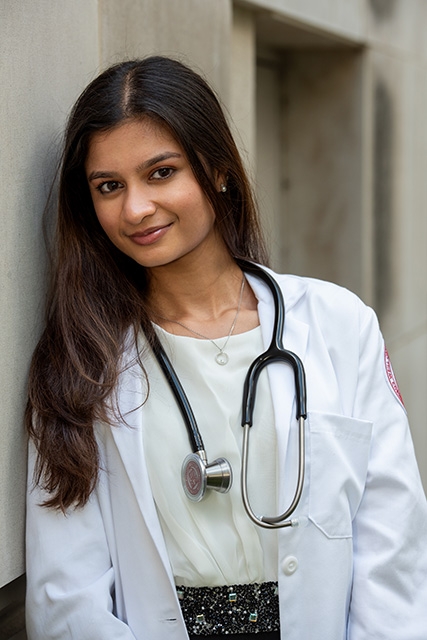Anisah Alladeen’s path to joining Weill Cornell Medical College’s Class of 2028 was almost 10 years in the making.
Growing up in a Guyanese household in Queens, Alladeen witnessed firsthand the challenges immigrant communities face navigating the health care system. She often found herself encouraging her family and community members to seek timely medical treatment, helping to manage doctor’s appointments and ensure their access to quality care. Then in 2017, when Alladeen was in high school, her grandfather was diagnosed with end-stage renal disease and received a kidney transplant at NewYork-Presbyterian/Weill Cornell Medical Center. She often visited him at the hospital after school and, seeing how he was treated by the doctors and staff, something clicked.
“I witnessed the compassionate and comprehensive care he received there and wanted to be a part of these institutions,” she said, “to contribute to this legacy of exceptional patient-centric and culturally competent care that I saw at Weill Cornell and NewYork-Presbyterian.”
Alladeen soon after began volunteering in Weill Cornell Medicine’s Department of Neurological Surgery, helping to provide emotional comfort to patients and their families and assisting nurses with tasks such as restocking equipment. Her growing passion for medicine drove her to participate in the HPREP program, which exposes high school students to the field, and was further kindled during her undergraduate studies at Cornell through research opportunities at Weill Cornell Medicine in New York and Doha, Qatar. She also participated in several mentorship initiatives, including four years as part of the PrIMES leadership team. Her goal: to one day become a doctor.
Now, Alladeen is taking her first steps toward achieving that aspiration. On Aug. 13, she and 105 of her fellow first-year medical students in the Class of 2028 received their short white coats during Weill Cornell Medical College’s annual White Coat Ceremony, officially marking the beginning of their medical education.
“I have been with Weill Cornell Medicine since I was 17,” said Alladeen, the first in her family to earn a college degree. “For me, this coat embodies the opportunities I will have as a medical student and doctor to empower patients to utilize preventative health measures. I am one step further in my goal of advocating for and serving vulnerable communities in need of care, like the one I grew up in.”
In front of friends and family in Uris Auditorium, students joined faculty members to receive their new coats, along with stethoscopes provided by the Moss Family Foundation and the Paul F. Miskovitz, M.D. ’75 Stethoscope Fund for Medical Students.
“As you receive your white coat today, you embark on this exciting and meaningful profession with a shared mission: serving our one world of humanity,” said Dr. Robert A. Harrington, the Stephen and Suzanne Weiss Dean of Weill Cornell Medicine. “Our work does not end. The responsibility to heal people who seek our help will last your entire career.”

First-year medical student Chelsea Asare receives her white coat from Weill Cornell Medicine Dean Robert A. Harrington.
The Class of 2028 adds to Weill Cornell Medicine’s robust and diverse community. Its students have lived, studied and worked in 35 different countries, and 49 percent of the class is bilingual or multilingual. Women comprise 56 percent of the class, and 33 percent are first-generation college students. Collectively, the incoming class attended 59 different undergraduate colleges across 27 states, with 11 Cornell alumni.
In her keynote address, Dr. Laura Riley, chair of the Department of Obstetrics and Gynecology, highlighted the sense of community and bonds that will form, as she urged the students to look at the classmates seated around them.
“Although you are diverse in your lived experiences and have diverse interests, starting today, these are your partners on the most remarkable journey ahead,” she said. “These are your colleagues in this work. You will make many contributions to medicine—providing excellent and equitable clinical care, pioneering scientific discoveries in the lab and igniting a passion for humanism as we teach the next generation.”
For Kwadwo Amoako-Boadu, a personal health experience sparked his interest in medicine. During his sophomore year at The City University of New York, he was diagnosed with pneumothorax, or a collapsed lung, a condition where air leaks into the space between the lung and chest wall.

First-year medical student Kwadwo Amoako-Boadu.
“I remember being in a lot of pain, and very frightened and anxious when they took me to the hospital for surgery to repair my lungs,” he said. “But when my doctor came into my room to explain the nuances of the procedure, I saw firsthand how a physician and the knowledge that comes with the white coat could provide comfort on the road to wellness.”
Amoako-Boadu, a biology major who hadn’t considered medicine before, realized he wanted to work with patients to not only treat their illnesses but, beyond that, convey that same sense of comfort and clarity to others. He asked his thoracic surgeon at NewYork-Presbyterian/Columbia University Irving Medical Center if he could shadow him and spent the next three years learning and exploring this new career path.
Upon graduating college, he then spent a year as a medical scribe at an urgent care facility in his own neighborhood in the Bronx and, like Alladeen, witnessed the health care disparities that existed in his community, including a shortage of primary care doctors.
“The encounters I experienced in clinical settings deepened my desire to become a physician, as I discovered that I wanted to provide the type of health care that I had both witnessed and received,” he said.
Now a first-year medical student, Amoako-Boadu donned his white coat proudly alongside his classmates, knowing he will soon be gaining the skills and knowledge to provide care to those who need it most.

